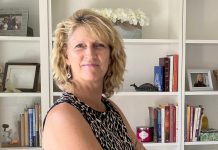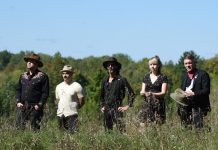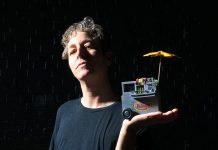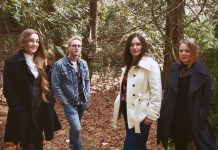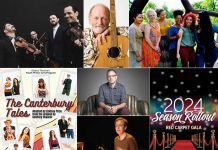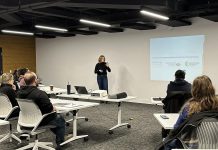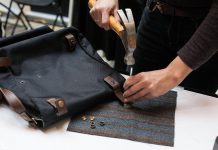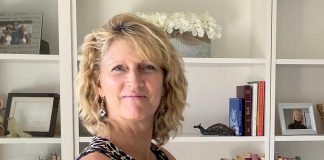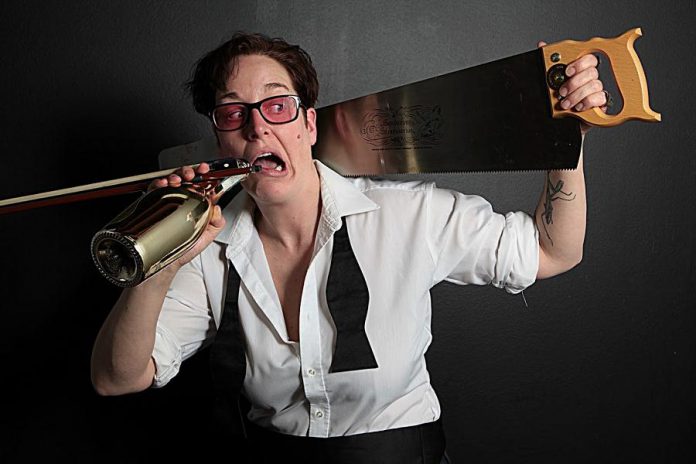
This guest post by Victoria Mohr-Blakeney, Performance Curator at Public Energy, is an excerpt from her series Curator’s Corner, which can be found at www.publicenergy.ca.
Charlie Cathy Petch is a playwright, actor, spoken word artist, and musical saw player.
Petch’s new full-length spoken word vaudeville play Mel Malarkey Gets the Bum’s Rush has toured all over Canada and is featured in Public Energy’s current season, coming to the Theatre on King from Wednesday, March 29th to Sunday, April 2nd.
Petch has toured nationally as a spoken word artist and member of the League of Canadian Poets. They are widely published, and have had nine plays produced.
It was an absolutely pleasure to get to ask Petch some key questions about their work, what motivates them, what inspires them, and how their performance practice continues to grow and evolve.
What was your inspiration behind Mel Malarkey Gets the Bum’s Rush?
It arose from a love for my principal instrument, The Musical Saw, which rose to fame in vaudeville. I wanted a show that would be a vehicle for it. Brian Sanderson and I had a “wouldn’t it be great if” conversation about marrying the kind of bold hilarity of the 1930s’ spirit of music with a vaudeville show. Years later here we are, working on music for a conversation I never forgot.
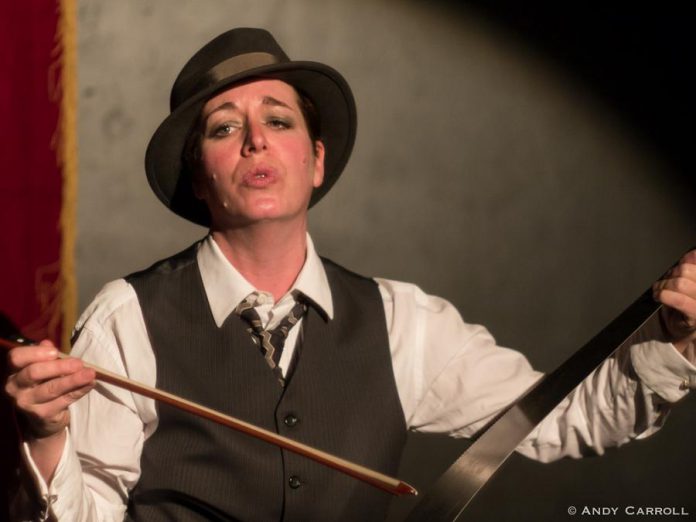
What was the development/creative process for Mel Malarkey?
I started it at the Banff Centre in April 2015 when Tanya Evanson was heading up the Music and Spoken Word program. I had time and space to develop the project and a little music hut where I played nothing but 1920 and 30s music. During this residency I also found out I got a creation grant from the Ontario Arts Council. Which, oh my gosh, was a huge relief since I’d left my day job for art.
Mel was someone I saw so clearly. The aging and bold principal player, a sort of Ruth Brown, Katherine Hepburn, or more so — Marlene Dietrich character, tragically hilarious and unabashed. It was there that I started to write the show. It took almost a year to really develop it. I worked with Evalyn Perry as a dramaturge and also got invaluable advice from Gerard Harris, RC Weslowski, and CR Avery.
What drew you to writing and performing initially?
Due to having a lateral lisp that got me beat up and bullied in the many different schools I went to at a young age, I’ve always preferred a proper stage to be myself, like this giant permission to open up your mouth and expect people to listen. I am divine with hecklers as a result. One of my tag lines is “Happiest Onstage” and it’s every bit the truth.
VIDEO: “Mel Malarkey Gets The Bum’s Rush” Trailer
Why is the story of Mel Malarkey important to you?
It’s a feminist story of someone who had her own business when women were being told to go back to staying at home and having babies. Who fought for everything she had during a time in history when women were only allowed to work during the war effort. She did so with no apology and with humour as a tool to get where she needed to be.
It’s also the story of a trans person who was only accepted onstage. These male and female impersonators were some of the trans people of that age. The story of Victor and The Elephant Lady normalizes the life of a trans person in 1930. Mel also talks about queerness, about sex work in an advocacy manner. I think her spirit around all of these topics is just as relevant today as it was in that moment in history. She is who I might have been, who I would have aspired to be, if I’d been born in her time.
I love a story that normalizes “alternative lifestyles”, because really, to a lot of us, this is a normal thing. I’ve done this show for all manner of audience. Sometimes they get the more radical aspects, and sometimes, they just have a great time and that’s wonderful. I’ve written it to be that way. It’s funny when one audience member has seen an almost completely different show than another. That’s what art can be though, open to interpretations without taking away the message of the artist.
Mel Malarkey is set as vaudeville is dying/declining — why is this moment in time of interest to you?
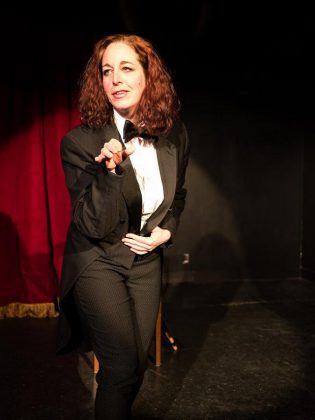
I absolutely love live theatre, so the rise of cinema as a popular mode of entertainment is something I see as a time where we accepted propaganda as a way of life; as Mel says “how do you trust an actor that never makes a mistake?” The decline of theatre was also a moment where less visually marketable artists were robbed of a platform.
Mel is very much against the perfectly polished persons we see on the screen. It’s a misrepresentation of what humans are and it’s so dangerous, the many ways this lead to the rise of the second world war, increased otherness, racism, sexism, homophobia, and fed the narrowed notion of the male gaze at the cost of so many bodies that were once considered beautiful. We can see the result of it today, which is why it’s so important to look at the beginnings of how propaganda became normalized.
Do you often write, develop and perform solo works — what is significant for you about this approach?
As a spoken word artist, I’ve been performing and developing mostly solo works since I found my path to the form in 2011. Before that, I have written and had nine plays produced, of which, none were solo works. What I find so interesting is how the spoken word theatre show is its own form of theatre. There truly is nothing to compare it to. Much like the poet who seeks to solely publish writes a very different form than the spoken word artist.
This marriage of theatre and spoken word is incredible and I’m so happy to be presenting it. This show has been taken to both the Fringe and to the Canadian Festival of Spoken Word. Each of these audiences has a unique appreciation for the form. For some spoken word artists, it’s the first time they’ve seen something like this and they are really energized to start thinking of their own full-length show.
Are there collaborative aspects to your work — if so how do they inform your practice?
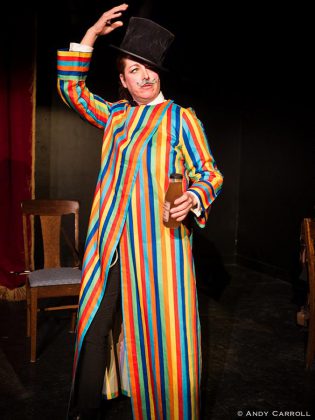
My work always craves music. When I travel as a spoken word artist, I will always have my musical saw onstage. I do saw poems, I have backing tracks to do pieces from, so sometimes I am collaborating with myself and sometimes it’s to music I love to be onstage with.
Mel Malarkey first toured with Em Glasspool as Dickie The Pianist, who also directed Mel’s original run. We had a grand time together; there’s an undeniable magic that happens with two artists so used to being onstage together.
When I received a grant for “Mel Malarkey Odes & Acts”, I began to write my own melodies that would be both supporting the onstage acts and the backstage moments and this album is both a radio show and a series of instrumentals to be used onstage.
I recorded it with Dave Tough, Brian Sanderson, Gratia Leitch, and Knott Rudy. These musicians really captured this moment in time, just as Dickie did. Music has always been a big partner with me onstage and I’m so excited for you all to hear what we’ve done.
What does it mean for you to get a chance to re-perform Mel Malarkey — how will this performance be shaped differently then when you first performed it at The Theatre on King?
I will be getting direction from my Bouffon Clown teacher, Adam Lazarus, about how to improve this newly developed Mel and I’m so excited for this. You’ll see a show that’s grown with each booking, audience, city and lessons learned. The pacing and the comedy will be tighter, the new instruments are a part of an even more bodacious Mel. It’s all about the accessories kittens.
I am also so excited about the addition of the album and the instrumentals that will be used for the backstage moments. I was always missing music there and due to the staging, it was impossible to have a live musician perform in these parts. Too much split focus. Now as I rehearse them with the backing tracks, well oh my gosh, they’ve become what I’ve dreamed they could be.
I was blessed to receive a grant from the Ontario Arts Council for the album “Mel Malarkey Odes & Acts with The Horsefeathers”. The musicians are incredible and they really brought out the 1930s feel of my melodies. Brian Sanderson, Gratia Leitch, Knott Rudy and Dave Tough know how to make things sound brilliantly timeless. The album release is also in time for Mel’s relaunch at The Theatre on King. What a year Mel’s had!
You’ll notice changes in Mel’s onstage acts, like The Medicine Show and Veasons Vor Vhy I’m a Total Tramp. She now plays the toy accordion, harmonica, ukulele and foot tambourine. Each of these help her to ham up these moments even more. Mel, like myself, likes to play multiple instruments kind of well so that people think she’s a musical genius.
A big thanks as well to Theatre Trent for the productions grant, as I was able to stop borrowing ukuleles and finally I have the right tambourine. The other one was a bit too big even for my wonderfully large clown feet.
You are doing a public workshop and moderating a panel while in Peterborough — what motivated you to do community engaged work on top of your performance work?
Public Energy approached me about working on a panel with trans and gender non-conforming people who live here in Peterborough/Nogojiwanong. What is it like to live here as an artist? How can we improve accessibility? Visibility? And like most groups we are not just trans artists, we are at all intersections.
Currently I’m working with EC3 as well to create a legacy document. We’re starting with a top 10 recommendations for businesses and organizations about how to gain a more diverse audience, patronage and make spaces friendlier to trans people at every intersection. We’ve been here since the dawn of human, so this is something very overdue and I’m happy to be asked to work on it.
I think this could become something wonderful. Imagine a directory for festivals that will show you the diversity of amazing artists you can book from all over the country. “We don’t know any…” will become a phrase of the past. Let’s stop accessing the same audience. It could be so much more for everyone.
The panel is made up of some excellent people who I already love working with. It’s open to the public and I think this sort of dialogue has the kind of potential to put Peterborough/Nogojiwanong on the map as a city that is fluent in accessibility. It’s not just about the spaces, it’s about the people in them and safety. There’s an element about anti-racism and de-escalation that I think is so important.
This is my hometown and my community. I have a huge vested interest in us doing better together. We’re known as a testing ground for the whole country. I would love it if being fluent in accessibility could be how we’re known. Sure, coffee whitener is a pretty good legacy, but really, this seems better.
Has working on Mel Malarkey brought anything new to light about your practice?
The spoken word theatre show is truly something unique. I’ve written a lot of spoken word, and theatre, so I can tell you, this form of theatre does not fit into any traditional category. I also tend to write in a rush and without much outside input. Becoming a full time artist and getting grants for development from the Ontario Arts Council meant that I could take the time the show deserved.
This is the most vetted piece of theatre or writing I’ve ever created. Going from a more two-handed piece to a solo show was something I learned and continue to learn so much from. Challenging myself to write the music for the live show and for the album is something I’ll truly cherish for the rest of my life. There was such a joy in that whole process.
Being able to create an album in Mel’s voice from Mel’s vaudeville dream, with the help of some of my favourite musicians and Beaches Digital Media with Michael Oesch at the helm of recording and having those tracks join me onstage, well … life can sometimes be a dream.


